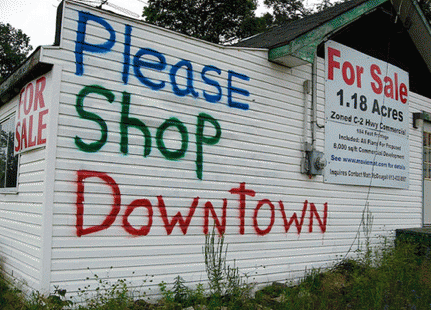Reprinted from yesmagazine.org
-
Photo by Peter Blanchard.
Chokwe Lumumba was an unlikely candidate for high office in Mississippi. But last June, the former Black Nationalist and one-time attorney to Tupac Shakur was elected Mayor of Jackson. He's now in hot pursuit, not of big box stores or the next silver bullet solution to what ails the state's capital city. He wants to create worker-owned cooperatives and small-scale green businesses and to invest in training and infrastructure. It's the program of change he ran on in the election: local self-reliance.
Jackson's population is 80 percent black, 18 percent white, and the rest largely immigrant, with heavy concentrations of Indians, Nigerians, and Brazilians.
-
Peaches, a soul-food restaurant on Jackson's historic Farish Street. The business was started in 1961 by Wilora "Peaches" Ephram and was frequented by leaders in the Civil Rights movement. Photo by Sheila Scarborough.
"Without question, the ideas of economic democracy that we want to propose come from the Southern context," says Kali Akuno, a member of the Malcolm X Grassroots Movement and a coordinator of special projects for the Lumumba administration.
That Lumumba won the election came as a surprise to some, but not to Akuno: "There exists an audience in the black community that is way more willing than others to experiment with distribution."
Self-reliance "is in our history. It's had to be," he continues. "People know about Fannie Lou Hamer organizing black voters to fight segregation, but do they know she also helped to start cooperatives with retail distribution across Mississippi that are still around today?"
Far from Mississippi, on the Pine Ridge Reservation, indigenous entrepreneur Mark Tilsen has just begun the process of turning ownership of his local food products company over to his workers. Tilsen founded Native American Natural Foods with his partner Karlene Hunter in 2006. Five years later, they won a Social Innovation Award from the Social Venture Network. Today, they're innovating again: joining a cohort of Native American leaders in a program to strengthen the local economy by democratizing wealth and ownership. The program has been developed by the Democracy Collaborative and the Northwest Area Foundation.
Tilsen and I talked via cellphone in August, as a hailstorm pelted down on the reservation. For many years, Pine Ridge has ranked as this nation's poorest place according to the U.S. Census. Eighty percent of the residents are unemployed; 49 percent live below the poverty line. In 2007, life expectancy was estimated at 48 for men and 52 for women. "Why co-ops?" I asked.
-
Mark Tilsen (back left) with staff of Native American Natural Foods. Photo courtesy of Native American Natural Foods.
"The goal of our company is wealth creation and self-determination on the Pine Ridge Reservation, so we want our employees to own the wealth they're creating. We didn't make this company to sell or flip it," answered Tilsen. "In tribal communities, traditional methods of production were based on "tiospaye'--the Oglala word for extended family structures," Tilsen explained. "That's how we survived and how we took care of one another, organizing points of production in a cooperative way. It's nothing foreign."
Tilsen hopes to have Native American Natural Foods in employee hands by June, 2014.
CommonomicsFarmer-philosopher Wendell Berry defines economy this way: "I mean not economics but economy, the making of the human household upon the earth; the arts of adapting kindly the many, many human households to the earth's many eco-systems and human neighborhoods." Welcome to "Commonomics," a new collaboration between YES! Magazine and GRITtv. Starting this month, we'll be traveling the country asking the question: what makes for a strong local economy? It's not a question that produces easy answers.
Beyond GDP: Measuring What Matters
Aggregate counts of economic activity like gross domestic product,
or GDP, give all activity equal value. The cultivating of an urban
farm, which may involve little paid work and consume few bought
materials, is less "productive," in GDP terms, than paving that
farm over.
"When grain prices go up, that's good for GDP but terrible for
hunger," says Joshua Farley, a professor in community development
and applied economics at the University of Vermont. "GDP is an
excellent measure of cost; a terrible measure of benefit."
To even start a new conversation, we need new measurements. As the
Business Alliance for Local Living Economies (BALLE) puts it, it's
time to start "measuring what matters."
Farley's been involved in studies of Burlington, Vt., using a
Genuine Progress Indicator, a version of the Index of Sustainable
Economic Welfare that looks at a community's overall well-being.
There are many variations of these alternative indicators. Though
most still equate value with consumption and growth, some include
factors that GDP leaves out--like the value of unpaid household and
volunteer work--and factor in the cost of pollution, depletion of
resources, and the consequences of uneven distribution of
wealth.
We don't yet measure the real costs of these problems in the United
States, because, for example, we tend to underprice energy,
transportation, and education, and pay no tax on environmental
pollution.
According to Robert Reich, former U.S. Labor Secretary and
a professor at the University of California, Berkeley, "A true
tally of all that might reveal the value of being more local."
(Note: You can view every article as one long page if you sign up as an Advocate Member, or higher).






